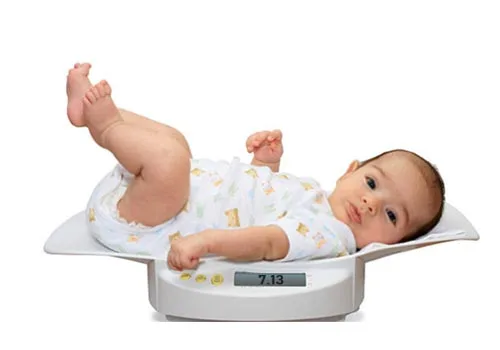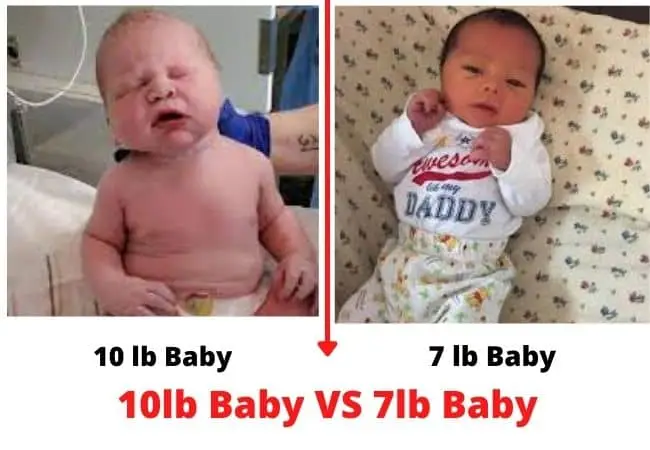According to pediatricians, baby weight reveals a lot concerning their health. Good weight indicates good physical development and proper nutrition. Therefore, as a nursing mother, monitor your baby’s weight on a monthly basis. You can take the average weight on a monthly basis.
A 10-lb baby is big in size and will not fit in the newborn diapers like the 7-lb babies. You will have to improvise.
However, it’s good to point out that average weight is different from normal weight. If your baby weighs in the lower percentiles, it doesn’t mean that the baby has a physical development or growth problem.
That being said, it’s easy to track your baby’s growth using the weight chart. Use the WHO weight chart until the baby reaches 2 years.
How big is a 10-pound baby?
A baby weighing 10 pounds at birth is considered overweight or obese. Mostly the delivery method is C-section because the baby is too big to pass through normal delivery. However, there are rare cases where mothers deliver them through normal birth.
Medical experts consider 5lb to be low birth weight. It means any baby weighing beyond that has a normal birth weight. The average baby weight at birth is 7.5lb. A full-term male baby has an average weight of 7lb 6 ounces or 3.3kg, while a full-term female baby has an average weight of 7lb 2 ounces or 3.2kg.
However, the average weight of babies born to 37-40-year-old mothers is 5.5lb to 10lb or 2.5kg to 4.5kg. Babies generally lose 10 percent of their weight after birth. Mostly, it’s because of fluid loss, which is normal. Expect them to regain lost weight within a week of birth.
Birth weight predicts both short-term and long-term health complications. For instance, a baby weight of 10-lb at birth indicates child obesity. A woman who is overweight at the time of pregnancy and birth will have a big baby.
The health of the infant’s parents has a direct bearing on the baby’s weight. If the mother has a history of diabetes, she will give birth to larger than normal babies. This includes gestational diabetes.
Heavily built parents like 6’2 and 5’8 onwards tend to have 10lb babies. So the size of the parents also plays a role.
The genetic characteristics of the mother and father play a significant role in the baby’s weight. If your baby weighs 10lb at birth, and either parent is overweight, then you have your answer. The weight of the mother at birth is more crucial in explaining how big the baby will be than the weight of the father at the same period.
Maternal nutrition affects the baby’s weight at birth. The socioeconomic conditions explain the mother’s weight gain. For instance, the kind of food she eats, health conditions, and her physical fitness.
10lb baby vs 7lb baby
What about the 10Ib baby?
There is a big difference between these two babies. You feel it mostly during birth as it takes a lot of energy to deliver a 10lb baby via normal delivery because of its size.
The big baby is due to existing health conditions of the mother like diabetes, and the mother may also be obese.
If the parents have passed down obesity, then the baby is born overweight because of the genes. In most cases, 10-pound babies are a result of the poor nutrition of the mother.
Normally, the pedestrian advises expectant mothers on foods to eat and those to avoid. However, some mothers disregard the advice, and the baby gets more nutrients than they need, resulting in overweight babies at birth.
Pedestrians will monitor a 10-pound baby more closely and advise the mother on nutrition and other infant care tips to ensure that the baby is healthy. As a mother, stick to the recommended nutrition to avoid complicating your baby’s growth and development.
The pediatrician recommends you reduce your carbohydrate intake while increasing vitamins, essential proteins, and fruits among other dietary supplements.
The best way to correct infant obesity is to regulate your diet. So, having a baby weighing 10 pounds means you will have a regular appointment with a pediatrician.

This is when the baby’s shoulder gets stuck behind the mother’s pubic bone during delivery.
The results are: baby to be born breech, which can be dangerous. Shoulder dystocia is more common in larger babies.
A higher risk for the baby to develop jaundice.
Jaundice is a yellowing of the skin and eyes caused by a build-up of bilirubin in the blood. It is more common in larger babies because their livers are not yet fully developed.
Overall, giving birth to a 10-pound baby is safe. However, there are some risks that should be considered. These risks can be minimized with the help of an experienced medical team.
What about the 7Ib baby?
Already the fact that your baby weighs 7lb means you have normal baby weight. There are no red flags. The baby only undergoes routine post-natal visits to monitor their weight and other statistics.
The 7lb babies are mostly singletons and second babies onwards. The mother’s have no pre-existing health conditions like diabetes, and they are no substance and drug abusers. Besides, the mothers attend prenatal care and follow the nutrition advice of the pediatrician.
Also, the mothers are in their twenties to early thirties, which explains why they have normal baby weight. Moreover, it’s not a first pregnancy because first births tend to be smaller.

On the other hand, delivering a 7lb baby is not as stressful as a 10lb baby.
Most maternity hospitals deliver 10-pound babies 2-3 weeks earlier than expected because of their size while others recommend an episiotomy.
A baby weighing 7 pounds is normal since the weight chart puts the figure at 7 pounds to 8 pounds.
A 7-lb baby is a healthy baby as their growth and development are normal.
Why do some mother’s have smaller babies?
A baby weighing 5 pounds at birth is considered a small baby or underweight.
In most cases, they are mid-term babies or babies born before the full nine months for various reasons.
Young mothers, mostly teenagers, tend to have low birth weight babies.
First babies are smaller than subsequent babies. Also, twins, triplets or quadruplets have low-birth weights and are generally smaller than singletons.
However, there are certain environmental factors that can contribute to a small baby. For instance, if the mother is a cigarette smoker or an alcoholic. Smoking causes physiological changes that reduce the flow of nutrients to the baby.
Also, exposure to secondary smoking can result in low birth weight babies. Smoking causes other complications like IUGR.
Mother’s not getting enough nutrition to have small babies. The food they eat doesn’t satisfy the nutrition requirements of both the mother and baby, resulting in low-birth weight.
Lack of regular and early prenatal care is attributed to low-birth weight. This includes poor access to health care due to several factors like geographical location, socioeconomic conditions, or mental health problems.
Mothers with high blood pressure problems tend to have smaller babies. The same goes for mothers with uterine conditions like bicomuate uterus and fibroids.
How do I monitor newborn weight gain?
Full-term babies mostly have normal birth weight and no health problems. It’s not a requirement that you regularly weigh your baby as long as you are following proper nutrition. The baby will develop normally.
Honor the regular pediatrician appointments to check the baby’s growth and development. The doctor monitors the baby’s weight and advises you accordingly.
Conclusion
Infant birth weight varies significantly depending on several factors like the age of the mother, the get condition, socioeconomic conditions, and drug abuse among others discussed above. However, having a 10-pound baby is a reason to worry because the baby is overweight. The normal birth weight is 7 pounds, which means your baby’s growth and development are normal.
Go for prenatal and postnatal appointments to ensure your baby is growing and developing normally. Prenatal appointments help prevent birth complications. Besides, pediatricians help you understand what to expect as your baby grows using growth graphs and how it affects the baby’s health.


